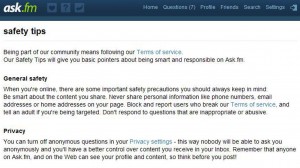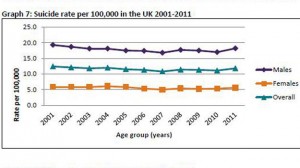The e-petition calls for ministers to “step in and insist that Ask.fm and similar sites help us protect our young people” following the death of Hannah Smith at her home in Lutterworth, Leicestershire, on Friday.
Her father said users of the website, which lets teenagers ask each other anonymous questions, had been taunting Hannah and telling her to die.
Bullies reportedly told Hannah to “drink bleach”, “go get cancer” and “go die”.
The petition had been signed by more than 5,000 supporters within hours of being posted on the government’s e-petitions website.
Hannah’s father Dave Smith has called for Ask.fm to be closed down, adding: “The person that created this website should be done for manslaughter. Any parents that have children please don’t let them go on this site.”

The ability to post anonymous questions on other user’s profiles makes the site a hotspot for so-called “trolling”.
It took Channel 4 News seconds to create an Ask.fm profile with a false name. All users are supposed to be over 13 but the only age control relies on users volunteering a genuine date of birth.
It was immediately apparent that users, many of them young girls, routinely suffer insulting, unpleasant and sexually explicit comments.
But users do have the option to turn off anonymous comments and to “blacklist” other members. The website also advises users to use the Report button to flag up “questions that cross the line”.
Ask.fm advises users: “If you receive a question that makes you uncomfortable for any reason, do not respond to the question, tell a parent, guardian or other trusted adult and block the user who sent it so they can’t contact you again.”
The site says anonymity “can be useful if you’re feeling shy or think that the recipient would be more comfortable answering a question without knowing who may have asked it”.
It says anonymity “should never be used to ask questions that are mean or hurtful” and warns prospective trolls that it reserves the right to hand over their identity details to law enforcement agencies if necessary.
Ask.fm also warns users as part of its terms of service: “You understand that in using the ask.fm service you may encounter content that may be deemed objectionable, obscene or in poor taste, which content may or may not be identified as having explicit language.”
The Child Exploitation and Online Protection Centre (Ceop) issued guidance on anonymous messaging sites including Ask.fm last year, saying: “The content Ceop has seen has been heavily based around bullying, however sexual chat and imagery is also apparent.”
But concerns about the site among child protection experts have centred on bullying rather than grooming by adult sex offenders.
Emma-Jane Cross from campaign group BeatBullying said thousands of young people like Hannah “face a daily barrage of online abuse, death threats and harassment”. She said as many as one in three young people are cyber-bullied and one in 13 faces persistent online abuse.
Peter Wanless, chief executive of the NSPCC, said: “The cruel nature of cyber-bullying allows perpetrators to remain anonymous and hide behind their screens. This is something that must be tackled before it gets out of hand.”
Other deaths
Hannah’s death comes after at least four other teenagers’ deaths were linked to bullying on Ask.fm.
Joshua Unsworth, 15, from Lancashire, was taunted by bullies on the site.
Jessica Laney, 16, was found dead at her home in Florida in December after anonymous bullies bombarded her with insults and asked: “Can you kill yourself already?”
The deaths of Irish schoolgirls Ciara Pugsley and Erin Gallagher last year were also linked to abuse on Ask.fm.
On Tuesday Ciara’s father Jonathan Pugsley said he sympathised with Hannah’s family and added his voice to calls for the site to be closed down.
Suicide rate stable
Despite worrying reports of young people killing themselves after online bullying, the overall UK suicide rate has remained relatively stable in recent years, according to various official statistics.
The Samaritans, who produced this graph, said in its latest report that there was a small increase in rates between 2010 and 2011, but suicides per 100,000 people remain lower than in 2001.

Men in their 40s are at the highest risk of suicide. While official statistics are not collected for under-15s, the number of suicides among children and young teenagers is low, according to the Samaritans.
British children ‘more cruel’
The owners of the site, Latvian entrepreneurs Mark and Ilja Terebin, have so far not commented directly on Hannah’s death.
Last year Mark Terebin gave a statement to Irish broadcaster RTE, saying: “We have only this situation in Ireland and the UK most of all. It seems that children are more cruel in these countries.”
In other statements, Ask.fm has said that it monitors content on the site around the clock and has policies in place to prevent antisocial behaviour.
A Facebook tribute page has been set up for Hannah and already had more than 33,000 “likes” by Tuesday afternoon. A small number of trolls had angered wellwishers by posting abusive messages.





![[Pin It] Credit: Dreamstime](http://bully4u.ie/wp-content/uploads/2013/08/bullies-kids-110208-300x200.jpg)
